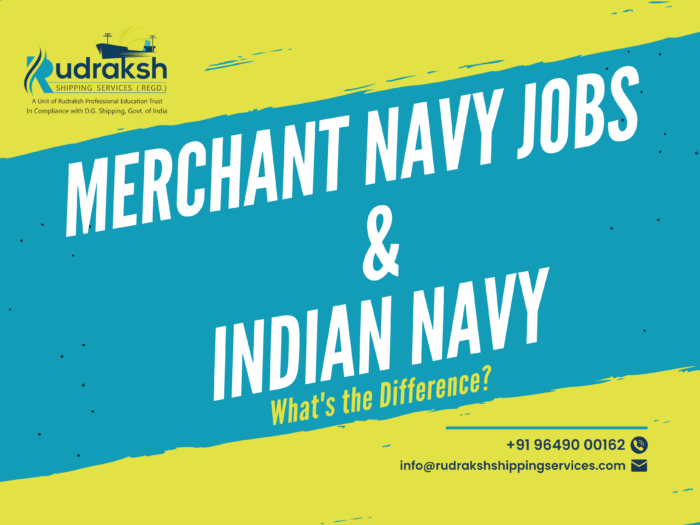Merchant Navy Job vs. Indian Navy: What’s the Difference?

When it comes to maritime careers, two paths that often get compared are the Merchant Navy and the Indian Navy. While both involve working at sea, the two have significant differences. In this blog post, we will explore these differences and help you understand which path might be the right fit for you.
Purpose and Responsibilities:
The primary difference between the Merchant Navy and the Indian Navy lies in their purpose and responsibilities. The Merchant Navy is a commercial fleet that operates cargo ships, tankers, and passenger vessels.
Its main objective is to transport goods and people across international waters. On the other hand, the Indian Navy is a military organization responsible for safeguarding India’s maritime interests, defending its coastline, and conducting various military operations.
While working in the Merchant Navy involves ensuring the safe transportation of cargo and passengers, the Indian Navy focuses on national security and defence.
Employment and Recruitment:
The Merchant Navy jobs are open to both Indian and international candidates. It offers lucrative employment opportunities for individuals interested in seafaring careers. Companies in the Merchant Navy hire individuals for various positions, including deck officers, engineering officers, ratings, and catering staff.
Recruitment in the Merchant Navy is typically based on educational qualifications, certifications, and experience in relevant fields.
On the other hand, the Indian Navy is a branch of the Indian Armed Forces and recruits Indian citizens exclusively.
Candidates who wish to join the Indian Navy can do so through competitive exams conducted by the Union Public Service Commission (UPSC) or the National Defense Academy (NDA). The selection process involves rigorous physical tests, written exams, and interviews.
Training and Education:
Both the Merchant Navy and the Indian Navy require specialized training and education. Individuals aspiring to work in the Merchant Navy can pursue courses from maritime institutes approved by the Directorate General of Shipping (DGS).
These courses cover various aspects of maritime operations, including navigation, engineering, and safety procedures. Additionally, candidates are required to obtain mandatory certifications such as the Standards of Training, Certification, and Watchkeeping (STCW) to ensure their competence and compliance with international regulations.
In contrast, the Indian Navy provides comprehensive training to its officers through the Indian Naval Academy (INA) and various other specialized institutions.
The training covers various aspects of naval operations, including navigation, weapon systems, leadership, and military tactics. The training period for officers in the Indian Navy is rigorous and focuses on developing leadership skills and discipline.
Career Prospects and Lifestyle:
The career prospects and lifestyle in the Merchant Navy and the Indian Navy differ significantly. In the Merchant Navy, individuals can work with international shipping companies, travel to different countries, and gain exposure to diverse cultures.
The career progression in the Merchant Navy is based on experience, qualifications, and professional development. It offers attractive remuneration packages, and individuals often enjoy a rotational work schedule, which allows for extended periods of leave.
On the other hand, the Indian Navy offers a challenging and highly disciplined career. It provides opportunities for personal growth, leadership development, and the chance to serve the nation.
The career progression in the Indian Navy is based on merit, and individuals can rise to higher positions of responsibility. While the lifestyle in the Indian Navy can be demanding, it also offers a sense of pride and camaraderie among its members.
In conclusion, the Merchant Navy and the Indian Navy are two distinct career paths within the maritime industry.
The Merchant Navy and the Indian Navy present distinct pathways for individuals with different career aspirations. The Merchant Navy beckons those intrigued by the prospect of commercial shipping and global exploration.
It offers opportunities to traverse the world’s oceans, engage in trade, and experience diverse cultures. Conversely, the Indian Navy provides a platform for individuals desiring a military career and the opportunity to serve their country. It encompasses a range of roles, from maritime security to humanitarian missions. Choosing between these paths hinges on an individual’s interests, aspirations, and long-term objectives, as both avenues offer unique and fulfilling experiences in their own right.
Choosing between the two paths ultimately depends on an individual’s interests, values, and long-term goals. For those drawn to the adventure of international trade, global travel, and a civilian career, the Merchant Navy can be an ideal choice. Meanwhile, those who have a strong sense of patriotism, a desire for military discipline, and a dedication to serving their nation may find the Indian Navy to be a fulfilling and honorable path. Both avenues offer unique challenges, personal growth, and a chance to make a positive impact in their respective domains.






